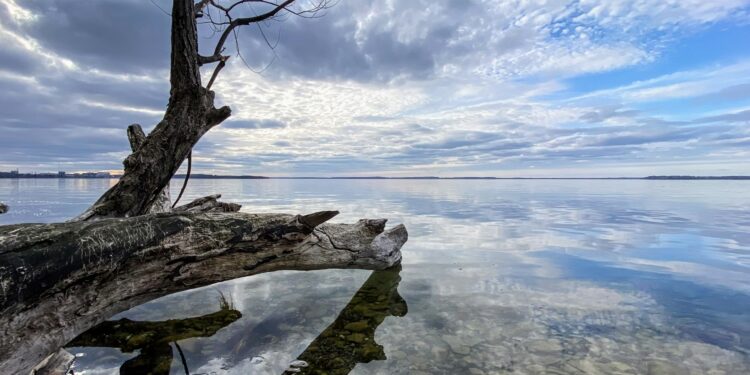Cycling Through Time: The Remarkable Evolution of Lake Mendota’s Bacteria
Have you ever found yourself trapped in a repetitive cycle, reliving the same series of events endlessly? In a similar vein, researchers have discovered that bacteria residing in Wisconsin’s Lake Mendota are caught in what could be termed a “Groundhog Year” scenario. A recent study published in Nature Microbiology reveals that these microorganisms experience rapid genetic transformations throughout the year, only to revert back to nearly identical genetic compositions during subsequent years.
Unraveling the Evolutionary Patterns of Lake Bacteria
Bacterial species within Lake Mendota exhibit swift evolutionary adaptations as they respond to significant seasonal variations. Each winter sees the lake freeze over, while summers erupt with algal blooms. These drastic environmental changes lead certain bacterial strains to thrive during specific seasons before being replaced by others better suited for varying conditions as the year progresses. This cyclical pattern mirrors the concept of rewinding and replaying an annual film.
“I was astounded by how many members of the bacterial community were experiencing such transitions,” commented Robin Rohwer, who led this groundbreaking research and is currently a postdoctoral scientist at The University of Texas at Austin. “I anticipated observing just a few notable examples; however, I found hundreds.”
Rohwer initiated her research while pursuing her doctorate at UW-Madison under Trina McMahon’s guidance and continued her work at UT Austin. This study significantly advances our understanding of how bacteria adapt within their natural habitats.
An Extensive Repository of Bacterial DNA
The scientists utilized an exceptional dataset comprising 471 water samples collected over two decades from UW-Madison researchers engaged in National Science Foundation-funded monitoring initiatives. This collection yields one of the longest metagenome time series ever compiled from a natural environment. By reconstructing fragmented bacterial DNA into full genomes, the team tracked genetic transformations across generations.
“This research revolutionizes our comprehension of microbial communities’ temporal changes,” stated Brett Baker, co-author and researcher at UT Austin. “We are only scratching the surface regarding what this data will reveal about microbial ecology and evolution.”
The findings unveiled not only cyclical patterns but also more enduring genetic modifications. For instance, during an especially hot drought summer in 2012—characterized by low algal levels—many bacterial species exhibited significant alterations in genes involved with nitrogen metabolism. This observation indicates that extreme environmental conditions can prompt sustained evolutionary changes among lake bacteria.
Consequences for Climate Change Dynamics
Climate change projections indicate more frequent extreme weather phenomena for regions like Midwestern U.S., mirroring conditions observed in Lake Mendota during 2012. Rohwer articulates that this study provides valuable insights into potential shifts microbial communities may undergo due to gradual climate alterations or sudden weather events.
“Climate change is influencing longer seasonal trends alongside triggering abrupt weather extremes,” explained Rohwer further emphasizing that their research suggests microbes will adapt accordingly to both types of climatic shifts.
Innovations Driving Genomic Research Forward
The research team capitalized on supercomputing capabilities provided by Texas Advanced Computing Center to reconstruct over 30,000 genomes spanning roughly 2,800 species from these samples—a task that otherwise would have required approximately 34 years using traditional computing methods on standard laptops.
“Think about each species’ genome like an entire book filled with chapters—the fragments we collect represent sentences scattered throughout those books,” Rohwer elaborated metaphorically emphasizing how reassembling them necessitates identifying which sentence belongs where within its respective context.
Microbial Complexity Unveiled Through Study
This investigation into Lake Mendota’s bacteria underscores not just their fragile resilience but also highlights sophisticated dynamics present within microbial ecosystems; exhibiting rapid evolutions paired with intriguing stability as they consistently return towards original states despite external pressures faced season after season – showcasing profound interconnectedness within ecological systems overall.
As climate variations persistently reshape ecosystems worldwide comparatively demonstrating how life modifies itself offers critical perspectives gleaned from studies like this one while underscoring ongoing observational efforts combined with high-tech analytical approaches essential for revealing nature’s intricate mysteries.
This insightful work appears published extensively throughout Nature Microbiology, leading readers toward greater awareness regarding aquatic health challenges ahead!
Interested in more thought-provoking content? Subscribe today for exclusive access to articles and updates! Explore EarthSnap—a free app brought forth by Eric Ralls via Earth.com!






